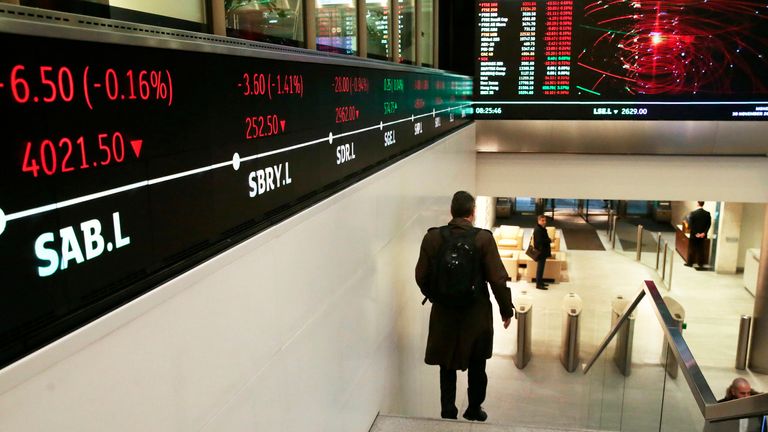IPO bankers 'should take fees in shares', top UK investor demands
LGIM will urge City regulators to strengthen minority investor protections through a series of sweeping reforms, Sky News learns.
Monday 22 March 2021 13:40, UK
Investment bankers who bring companies to the London Stock Exchange should receive part of their fees in stock to align their interests with those of shareholders, the market’s biggest investor is to demand.
Sky News has learnt that Legal & General Investment Management (LGIM) will call for sweeping measures to protect minority investors in a submission to the City regulator when it begins consulting on reforms proposed as part of a recent review of the UK listings regime.
LGIM - the biggest institutional shareholder in London's blue-chip companies - will call for dual-class shares to be excluded from premium indices for three years after their listing.
It will also demand that the appointment of chairs takes place at least six months before companies make their debut on the public markets, and that investment banks publish the sponsorship letters which seek to provide reassurance to investors about the underlying health of IPO candidates.
Lock-up agreements which are supposed to prevent insiders selling chunks of stock ahead of a specified deadline are too often flouted with the permission of the sponsoring banks and should be toughened, LGIM is expected to add.
The asset manager's submission is being overseen by Sacha Sadan, LGIM's director of investment stewardship and one of the City's most influential corporate governance figures.
The firm's call for an overhaul of the way banks are remunerated for their work on taking companies public will reverberate across the City at a time when a glut of businesses are taking advantage of benign market conditions to list their shares.
So far this year, Trustpilot, the ratings platform, bootmaker Dr Martens and the online greeting cards retailer Moonpig have floated in London.
Others, including the money transfer service Wise and cybersecurity company Darktrace are preparing to go public.
Large IPOs can generate tens of millions of pounds in fees for the banks which arrange them, with the money usually paid regardless of the subsequent performance of a recently listed company's shares.
Mr Sadan cited APR Energy, which floated in London in 2011 and was taken private again four years later at barely a tenth of its IPO valuation, as an example of a flotation where the investment bank had been largely paid according to the shares' performance.
"LGIM supports new innovative companies and wants to constructively improve the IPO market to be truly enduring," he told Sky News on Monday.
"IPO success should not be measured on day one, but over the long term."
His comments come on the same day that Deliveroo, the food delivery app, unveiled the price range for one of London's biggest and most eagerly awaited IPOs for years.
The company, which has been a big pandemic winner, said it would seek to sell shares at a valuation of between £7.6bn and £8.8bn, a vast premium to a $7bn (£5.8bn) fundraising undertaken just nine weeks ago.
While LGIM's proposals to reform the IPO process are not deliberately timed to coincide with Deliveroo's flotation, the arrival of such a prominent, yet loss-making, company on the London stock market will stoke concerns about the valuations attached to many tech businesses.
Earlier this month, Lord Hill, the former EU financial services commissioner, published a review of the UK listing regime after being asked by the Treasury to consider ways of boosting the City's chances of luring fast-growing companies.
The peer recommended modernising rules to allow dual-class share structures within the premium listing segment, and reducing free float requirements from 25% to 15%.
He also called for the liberalisation of the framework for so-called Special Purpose Acquisition Companies, which have raised tens of billions of dollars in the US in recent months, accelerating the gulf between New York and London's equity markets.
The Financial Conduct Authority will consult on many of Lord Hill's proposals in the coming months.
Some of LGIM's suggestions, including the one about dual-class shares being excluded from premium indices, would apply to companies such as Deliveroo, where the founder, Will Shu, will be allowed to retain control despite holding only 6% of the stock.
Mr Sadan insisted that dual-class structures did not provide adequate protection to minority investors against poor management behaviour that could lead to the destruction of shareholder value.
Not all of the calamitous performers in the London market had unconventional governance structures.
Many investors were left scarred by the experience of buying shares in Aston Martin when it floated in 2018 - a process which cost £13m in fees and commission to banks, despite the fact that the shares crashed within a matter of months.
Penny Hughes was appointed as the luxury car marque's chairman just before it went public, an example of a situation that LGIM will argue in its consultation response weakens governance and controls at the top of public companies.
Ms Hughes has since stepped down from the Aston Martin board.
LGIM's intervention will revive echoes of a letter sent to investment banks a decade ago by two executives at BlackRock, in which they lamented the state of London's IPO market and called for urgent reforms.







